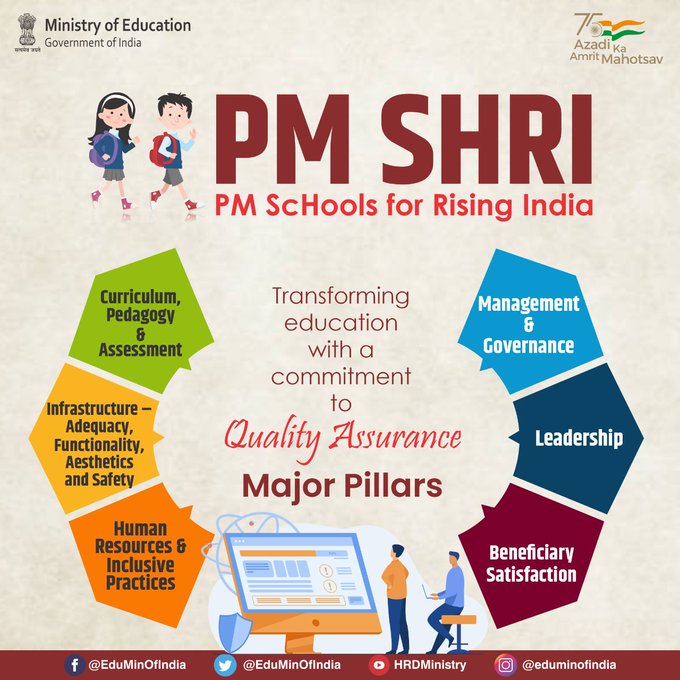
The PM-SHRI Scheme (Prime Minister’s Schools for Rising India) is an initiative by the Government of India aimed at upgrading school education in India, making it more holistic, inclusive, and of global standards. Launched in 2022, this scheme is set to bring about a monumental transformation in the quality of education provided to students in government and aided schools.
Objectives of the Scheme:
The PM-SHRI Scheme was introduced to achieve the following key objectives:
- Upgrade School Infrastructure: To modernize the infrastructure of schools and provide state-of-the-art educational tools.
- Improve Quality of Education: To ensure that students across India have access to high-quality education that includes essential life skills and vocational training.
- Support Holistic Development: To focus on a holistic approach to education, incorporating sports, culture, and life skills into the curriculum.
- Promote Equity in Education: To ensure that every child, irrespective of their socio-economic background, has access to the best educational facilities.
Eligibility Criteria:
The PM-SHRI Scheme is primarily aimed at government and aided schools across India. However, to benefit from the scheme, these schools must meet the following eligibility criteria:
- Schools must be government-run or aided schools.
- Primary and secondary schools are eligible for upgrading under the scheme.
- The school must demonstrate commitment to improving the quality of education and infrastructure in line with the objectives of the scheme.
- Schools will be selected based on a performance-based model that considers factors such as quality of teaching, infrastructure, and student outcomes.
Key Features of the PM-SHRI Scheme:
The PM-SHRI Scheme comes with several features that aim to improve the quality of education in India’s government schools:
- Infrastructure Upgradation: Schools under this scheme will receive financial assistance for modernizing infrastructure, including better classrooms, libraries, laboratories, and sports facilities.
- Training and Professional Development for Teachers: Teachers will receive professional development training to adopt modern teaching methods, including the use of technology in the classroom.
- Curriculum Enhancement: The curriculum will be revised to incorporate more vocational training, life skills, and critical thinking exercises.
- Digital Learning Tools: Schools will be equipped with smart classrooms, digital content, and other tools to enhance the learning experience for students.
- Inclusive Education: The scheme emphasizes inclusive education, ensuring that children from marginalized communities have access to quality education.
Financial Outlay:
The Government of India has allocated Rs. 27,360 crore for the PM-SHRI Scheme over the next 5 years. This funding is aimed at upgrading the infrastructure and enhancing the overall educational experience in selected schools across India. Some key financial details include:
- Infrastructure Modernization: A significant portion of the funding will be used to improve school infrastructure, including smart classrooms, libraries, and playgrounds.
- Teacher Training: The scheme also allocates funds for teacher professional development, ensuring that educators are equipped with the skills needed for modern teaching techniques.
- Technology Integration: Funds will be directed towards providing digital learning tools, including smart boards, computers, and internet connectivity for schools.
- State-Level Disbursements: Financial aid will be disbursed to schools based on their needs and performance, ensuring that resources are efficiently allocated to schools that demonstrate the capacity to improve.
Scheme Implementation Process:
The implementation of the PM-SHRI Scheme follows a structured process to ensure transparency and efficiency:
- Selection of Schools: Schools will be selected based on an evaluation of their current infrastructure, teaching standards, and the willingness of the school to meet the criteria set by the government.
- Infrastructure Upgradation: Once selected, schools will receive funding for the modernization of their facilities.
- Teacher Training Programs: Teachers will undergo training on modern teaching methods, technology integration, and student-centered teaching practices.
- Regular Monitoring: The performance of schools under the scheme will be regularly monitored through inspections and assessments to ensure the implementation of the scheme is in line with its goals.
Documentation and Application Process:
While the application process for the PM-SHRI Scheme is primarily handled by the State Education Departments, schools need to provide the following documents:
- School Recognition Certificate: Schools must submit their recognition certificate issued by the concerned education department.
- Performance Data: Schools must provide data on academic performance, infrastructure, and teacher qualifications.
- School Improvement Plan: Schools must submit an improvement plan detailing how they intend to use the funding and improve their infrastructure.
Current Progress/Performance of the Scheme:
The PM-SHRI Scheme has made significant progress since its launch:
- For Fiscal Year 2025-26 this Scheme has received the budget allocation of ₹1,450 Crore making total allocation to ₹7,500 Crore after including previous allocations.
- As of 2023, 14,500 schools have been selected across the country for upgrading under the scheme. These schools have received financial aid for infrastructure and teacher training.
- Teacher training programs are already underway in many of the selected schools, and teachers are being equipped with modern teaching techniques and tools.
- The first phase of infrastructure upgrades has begun in 5,000 schools, including the installation of smart boards, provision of digital learning tools, and renovation of classrooms.
The scheme’s current performance shows promising results, with many schools reporting improved student outcomes and enhanced learning environments.
Impact of the Scheme:
The PM-SHRI Scheme is expected to have a long-lasting impact on the quality of education in India. Some of the key impacts include:
- Improved Student Learning Outcomes: With better infrastructure, modern learning tools, and a revised curriculum, students will benefit from a more engaging and effective learning environment.
- Enhanced Teacher Competency: Teachers will gain new skills and strategies for effective teaching, benefiting students in the long run.
- Reduced Dropout Rates: By offering quality education and modern amenities, the scheme aims to reduce dropout rates and ensure more students complete their education.
Updates and Reforms:
The PM-SHRI Scheme continues to evolve. In 2023, the scope of the scheme was extended to include more schools, and additional funding was allocated for schools in remote and underserved areas. The curriculum is being further updated to align with global educational standards.
Challenges & Criticisms:
- States like Kerala, West Bengal & Tamil Nadu etc. have opted out of this scheme showing concerns over risk of centralization as it is been aligned with NEP 2020.
- Kerala has raised the funding dispute of ₹ 1,500 Crore being withheld with Central Govt as Kerala has refused to joined this initiative.
Conclusion:
The PM-SHRI Scheme is a game-changer for school education in India. By focusing on infrastructure, teacher training, and modern teaching methods, it promises to transform the learning experience for students across the country. While the scheme is still in its early stages, its long-term impact on India’s education system can be significant, ensuring that students are better prepared for the future. However, this scheme continues to play a pivotal role in enhancing the quality of school education in India. With increased funding and a focus on holistic development, the scheme aims to create model schools that can serve as benchmarks for others. Although, addressing the concerns of non-participating states still remains crucial for the scheme’s nationwide success.


